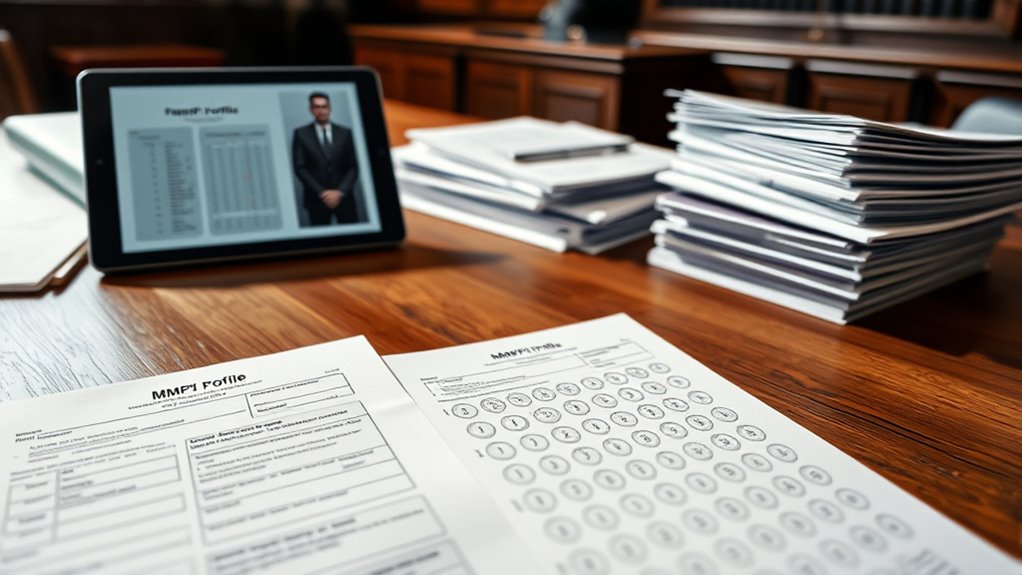The MMPI plays a vital role in forensic assessments by offering objective insights into a person’s personality, mental health, and potential behaviors relevant to legal cases. It helps identify honesty, response styles, and possible manipulation, ensuring the results are accurate and trustworthy. Its detailed profiles support decisions on competency, risk, and responsibility. If you want to understand how these profiles inform legal outcomes, continue exploring its applications in forensic settings.
Key Takeaways
- The MMPI provides reliable personality data crucial for legal decision-making in forensic cases.
- Validity scales ensure truthful responses and detect response biases or manipulation attempts.
- It assists in assessing mental state, competency, and risk factors relevant to legal judgments.
- Interpretation integrates multiple scales to identify traits like antisocial tendencies or emotional instability.
- The MMPI’s objective, empirical approach enhances the credibility and accuracy of forensic evaluations.

The Minnesota Multiphasic Personality Inventory (MMPI) is a widely used psychological assessment tool that plays a vital role in forensic evaluations. When you’re conducting a forensic assessment, you need reliable and valid data to inform legal decisions, and the MMPI provides just that. Central to its effectiveness are the validity scales, which help you determine whether a person’s responses are honest, consistent, or if they’re trying to manipulate the results. These scales enable you to identify potential response biases, such as exaggeration, minimization, or random answering, making certain that the personality profile you create reflects true psychological functioning. By carefully analyzing these validity indicators, you gain confidence that the personality profiling derived from the MMPI is accurate and meaningful, which is essential in legal contexts where stakes are high.
The MMPI’s strength lies in its ability to generate detailed personality profiles, revealing underlying traits that may influence behavior. When you interpret the results, you’re not just looking at isolated scores; you’re integrating data from various scales to understand the individual’s psychological makeup. This holistic view helps you identify patterns associated with specific conditions, such as antisocial tendencies, impulsivity, or emotional instability. As a forensic evaluator, you rely on this detailed personality profiling to inform decisions about competence, risk assessment, or mental state at the time of an offense. The MMPI’s robust structure ensures that these profiles are grounded in empirical evidence, adding objectivity to what can sometimes be a subjective process.
Furthermore, the validity scales serve as a safeguard, alerting you to potential distortions that could compromise the assessment’s integrity. For example, if someone is trying to appear more favorable or hide problematic traits, the validity scales will often flag these efforts. This allows you to interpret the personality profile with caution or seek supplementary data if needed. The combination of validity measures and personality profiling makes the MMPI a powerful tool in forensic settings, guaranteeing that your evaluations are both precise and credible. Ultimately, you use the insights gained from the MMPI to support legal outcomes, whether it’s determining criminal responsibility, assessing risk, or guiding treatment recommendations. Its reliability and depth make it an indispensable resource for forensic psychologists like you working in complex legal environments.
Frequently Asked Questions
How Reliable Is the MMPI Across Different Forensic Populations?
You can rely on the MMPI’s consistency and standardization across forensic populations, but its reliability varies with cultural validity. While it generally provides accurate insights, cultural differences and specific forensic contexts can affect results. It is crucial to interpret scores carefully, considering cultural background and population-specific norms. This ensures that the assessment remains valid and reliable, giving you a clearer understanding of the individual’s psychological profile in a forensic setting.
What Are Common Pitfalls in Interpreting MMPI Results in Court?
When interpreting MMPI results in court, you should watch out for bias distortion and cultural considerations. Bias distortion can lead you to over- or under-report symptoms, skewing your evaluation. Cultural factors influence how individuals respond, so ignoring these can result in misinterpretation. Always consider these pitfalls to guarantee your assessment remains objective, accurate, and fair, avoiding misleading conclusions that could impact judicial decisions.
Can the MMPI Detect Malingering or Feigning?
Yes, the MMPI includes specific scales for malingering detection and feigning assessment, helping you identify if someone is exaggerating or faking symptoms. These scales analyze inconsistent or exaggerated responses, providing valuable insights into the respondent’s honesty. However, remember that no test is foolproof; always combine MMPI results with clinical judgment and other assessment tools to accurately determine malingering or feigning behavior in forensic evaluations.
How Does the MMPI Compare to Other Forensic Psychological Tests?
You might think the MMPI is the gold standard, but it actually faces standardization issues and cultural considerations that can limit its accuracy. Compared to other forensic tests, it offers thorough personality insights but may lack specificity for certain legal questions. While it’s widely used, you should be cautious about over-relying on it, as other tools might better address particular forensic concerns or cultural differences.
Are There Legal Restrictions on Using the MMPI in Forensic Cases?
You should be aware that legal constraints and ethical considerations govern using the MMPI in forensic cases. Courts may scrutinize its admissibility, especially if proper procedures aren’t followed. You must guarantee that your evaluation adheres to professional standards, maintains confidentiality, and is relevant to the legal issue. Failing to meet these requirements can limit or exclude the use of MMPI results, risking legal challenges or ethical violations.
Conclusion
In forensic assessments, the MMPI acts as a double-edged sword—offering valuable insights yet requiring careful interpretation. Just as a key open a door, it can reveal truths or obscure biases if misused. You harness its power to uncover hidden facets of personality, but must remain cautious of its limitations. Ultimately, the MMPI is both a tool of clarity and complexity, guiding you through the intricate maze of human behavior with precision and care.
Felicity, our Author, pens in-depth articles and guides that delve into the heart of personal discovery. Her narrative-driven approach weaves together theory, practice, and personal anecdotes, making the journey of self-exploration both relatable and inspiring. Felicity’s contributions help illuminate the path for those seeking a deeper understanding of themselves and their relationships.










